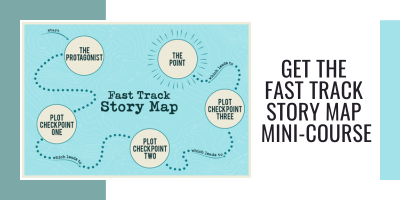 We're just a few days into National Novel Writing Month! If you've joined in the challenge of writing a 50,000-word novel during November, I hope you're off to a good start!
We're just a few days into National Novel Writing Month! If you've joined in the challenge of writing a 50,000-word novel during November, I hope you're off to a good start! HERE ARE SOME QUICK TIPS TO MAKE THIS YEAR'S NANOWRIMO A SUCCESS
Whether you're participating in NaNo or working on any other writing project, these tips can be a valuable addition to your creative toolkit.
So without further ado, here are my top tips for NaNoWriMo:
1. Start with a Plan
No matter if you've done any prep work or not, it's good to have some sort of a plan when starting NaNoWriMo. If you've already grabbed my Fast Track Story Map to help craft a broad structure, great! If not (you can sign up here to be notified when it opens up again), at the very least determine where your story will begin and where it will end. Having these minimal architecture in place can guide you as you approach the 40,000-word mark and need to wrap up all those loose ends flapping around in your story!
2. Designate a writing schedule
Assigning small pockets of time to write during your day can sometimes accomplish more than larger chunks of time! This can be 20 minutes in the morning before everyone else in your house gets up. 10 minutes on your lunch break at work. 15 minutes as you wait to pick up kids after school. The amount of time is less important than the commitment to a schedule. It's hard to fit writing in when there are so many things vying for your time, but if you give them the easy time commitment and non-negotiability of things you do every day, like brushing your teeth or checking your mailbox, you'll be more likely to do them. Remember, the only way to eat an elephant is one bite at a time!
3. Don't edit
Challenging though it may be, resist the urge to edit the first draft. The first draft is often referred to as the vomit draft because it isn't supposed to be pretty. It stinks, it's all over the place, and it's a mess! Let your first draft be exactly that! Save your edits for the revision phase.
4. End on an incomplete sentence or before you finish the scene
Stopping your writing session when you could keep going makes it easier to pick up the next day. Leaving a scene or sentence unfinished can act as a launchpad for your next writing session.
5. Stick to daily word counts
This tactic, similar to #4, encourages you to work within parameters, which always inspires productivity and creativity. Once you hit that daily count, stop, and put your writing away until the next day.
Best of luck with your story!

Love this content?
Subscribe to The Story Guide Dispatch for more!
Find Story Guide




















0 Comments